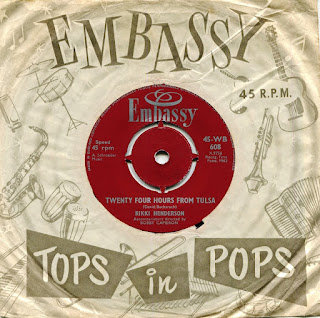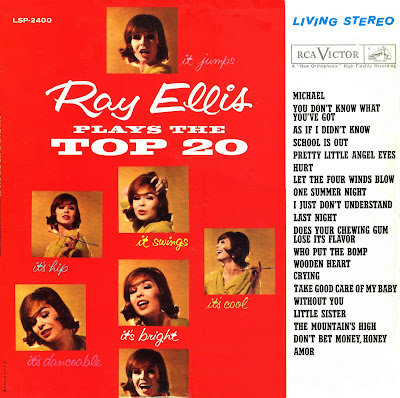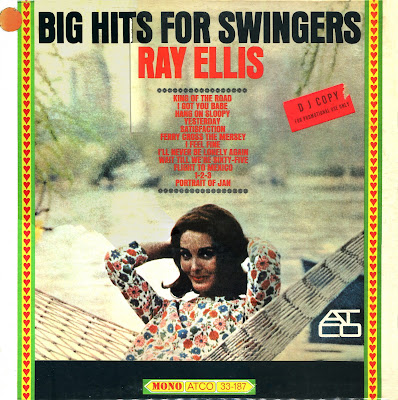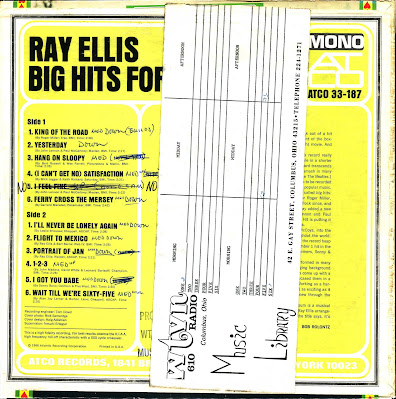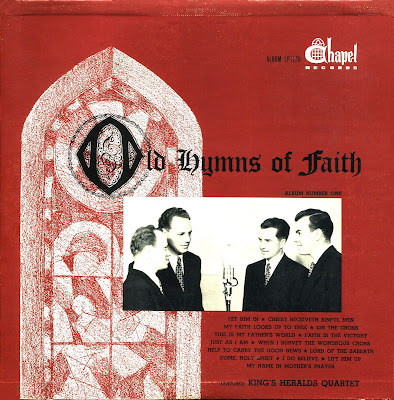Hard to believe that Instrumental Performances of the Same Exciting Vocal Versions wasn't the result of a contest to find the dumbest album title yet released. Maybe it was. I mean, for sheer awkwardness, it's impossible to top. I can see someone using it as a working title, to be replaced by a more graceful version. Maybe that was the plan, and it never happened. Who knows?
("You're calling my album what??"--Johnny Arthey)
Luckily, the music is way better. Johnny Arthey was the real deal: An arranger for Petula Clark, Mary Hopkin, Jonathan King, Julie Rogers, Engelbert Humperdinck, and others. Hence, these instrumental performances (of the same, blah blah blah) sound authentic. Expert arrangements all--they occupy a fascinating place between easy listening and Top 40 rock and roll. Typical instrumental pop of the period, but without any blunting of the r&r effect. I Feel Fine is just one example of an excellent rocker that loses none of its edge when arranged for orchestra. A miracle of an LP, really.
However, I have to say that during the editing process, these tracks lost much of their appeal. Something to do with working with sections of selections--much of the impact is lost. On the other hand, now you don't have to listen to the occasional surface glitches. These sound way better without them. But the editing part can get tedious, even when the material is fine, as here.
Proof that there's "no free lunch." No, wait--that doesn't apply here. Sorry.
Just an outstanding selection of top "English" hits of 1964: Wishin' and Hopin' (Bacharach-David), Time Is on My Side (N. Meade), You Really Got Me (Ray Davies), Bits and Pieces (Clark-Smith), and the "McCartney-Lennon" World Without Love, From a Window, and the "Lennon-McCartney" I Feel Fine. I'm guessing that the name order is correct on the John and Paul numbers, since the first two (for Peter and Gordon and Billy J. Kramer) sound like McCartney numbers, while I Feel Fine is very Lennon-esque. Or maybe someone in the credits department screwed up. Anyway, as much as I love I Feel Fine, my favorite of the John/Paul numbers is probably the incredibly charming From a Window, which of course is one of the songs the Beatles "gave away." Meanwhile, How Do You Do It was initially favored by George Martin for the Beatles' first single release, but I forgot why it wasn't. (Love Me Do won out.) And How Do You Do It became a hit for Gerry and the Pacemakers, of course.
Decent liner notes, for once: "The music speaks for itself in an effervescent and exacting way." I'll buy that. Fine Mercury stereo, to boot. I'd still like to know who approved that album title, and why.
DOWNLOAD: Johnny Arthey Orch.--Instrumental Performances, etc., 1965
Wishin' and Hopin'
My Boy Lollipop
The Wedding
Time Is on My Side
You Really Got Me
Bits and Pieces
World Without Love
How Do You Do It
From a Window
Do Wah Diddy Diddy
Needles and Pins
I Feel Fine
Mercury SR-60996, 1965
Lee







